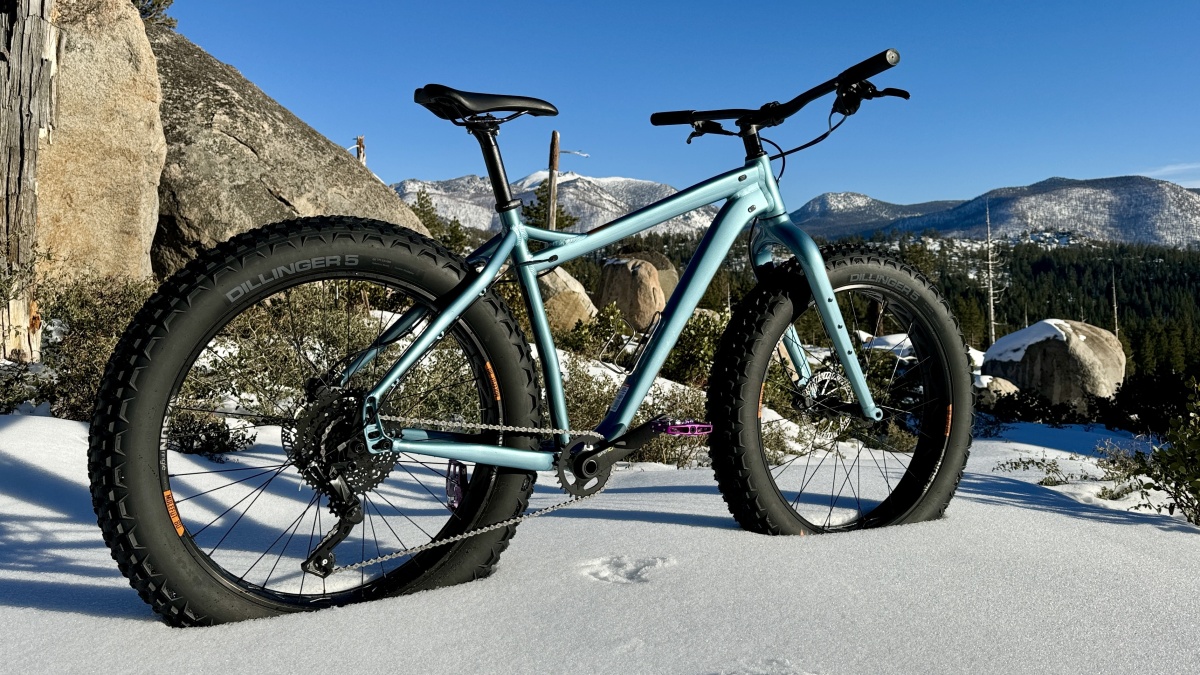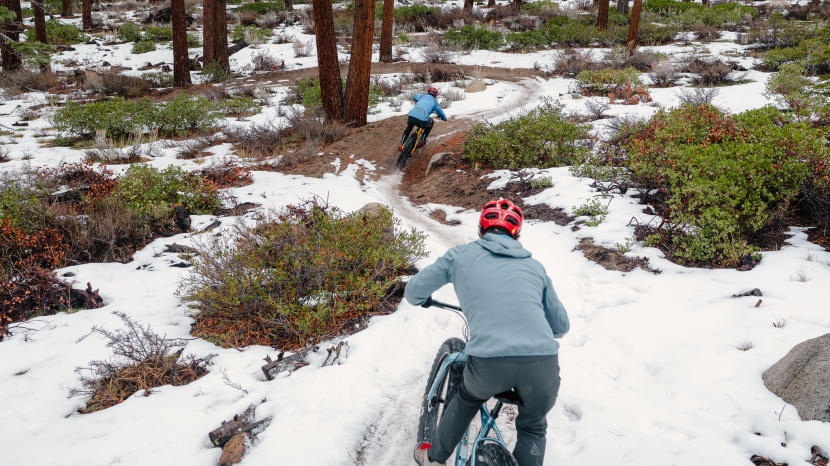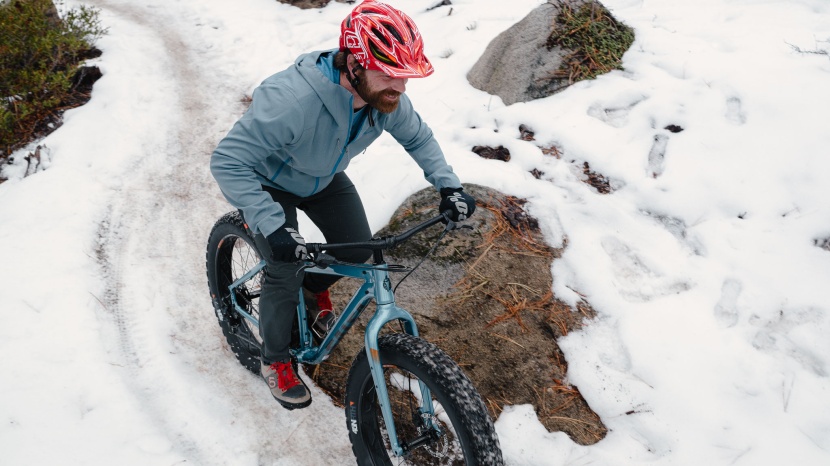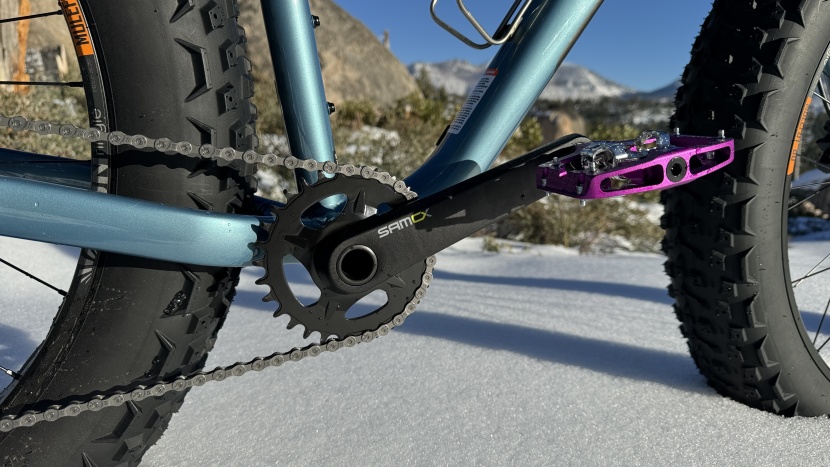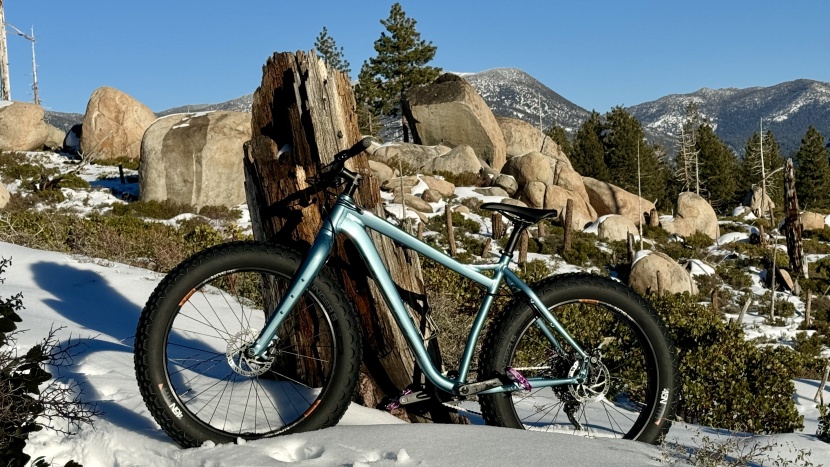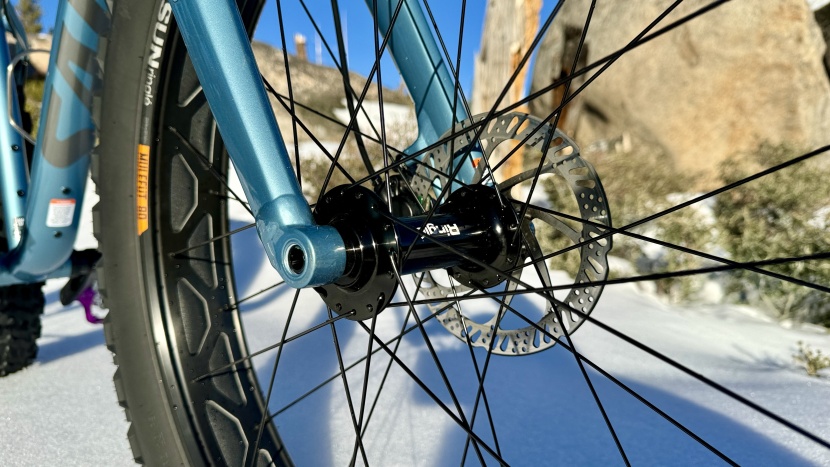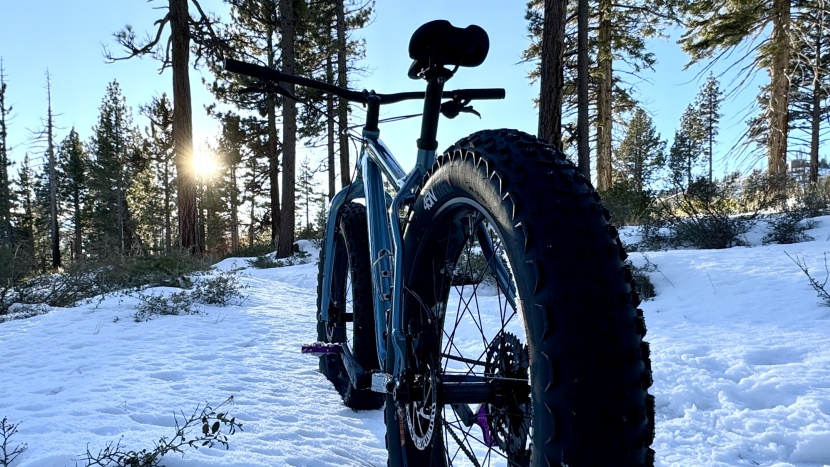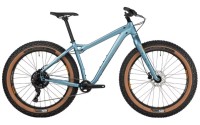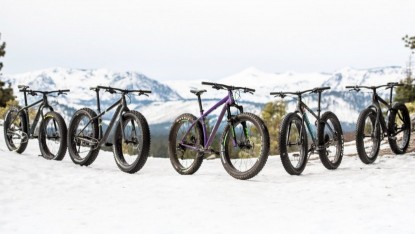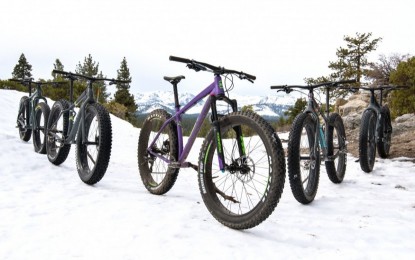
Our Verdict
Our Analysis and Test Results
Salsa conducted an audit of its names and found the Mukluk name — inspired by traditional indigenous footwear in Arctic regions — to be potentially problematic. That, folks, is how this bike got its name, the Heyday! was born. The Heyday is designed to be a Swiss army knife of a fat bike and a bit of a gateway drug. The bike offers incredible versatility with abundant cargo and accessory mounts, the ability to run different wheel sizes, and even adjustable dropouts. Value is another “feature” Heyday brings to the table. Salsa kept the barrier to entry low with this model, but you won't make many sacrifices. The 6066 aluminum frame blends durability and weight savings with stable geometry for exploring far and wide. The Bearpaw Aluminum fork and microSHIFT's trusty Advent wide-range 9-speed drivetrain round out the value package.
2026 Update: Salsa has added a Shimano Cues drivetrain option for this bike and priced it the same as the Advent group. There are also two carbon versions of this bike for those seeking a lighter-weight, backcountry-capable ride.
Downhill Performance
The Heyday is a perfectly capable fat bike and likely an optimal choice for riding the moderate rolling terrain that it was designed for. Sure, you can point it down some steeper, rougher trails, but this bike's conservative geometry and lack of suspension simply work better on mellower terrain. When riding within its speed and aggressiveness limits on packed snow, sand, and smoother singletracks, the Heyday performs admirably.
Like many other models in this review, the Heyday is a fully rigid bike. As such, it isn't meant to charge down the rowdiest trails at speed. Instead, it was designed to ride smoother and often soft conditions like snow and sand. The Heyday's geometry also speaks to its mellower intentions; listen to it. The 69-degree head tube angle feels ideal for riding this bike in loose conditions. It's slack enough to calm the steering but steep enough to still give it quick and responsive handling. The 1150mm wheelbase is shorter than the rest of the bikes in this review, which helps to keep the Heyday maneuverable, though it isn't itching to go faster. When pushing the envelope, you can tell when you've hit the Heyday's speed limit; the bike feels a bit more nervous than the slacker models. That said, it does have a moderately long reach measurement, for a fat bike, of 446mm, which helps to give the rider a comfortable, and not too upright, upper body position when descending. The low 315mm bottom bracket height felt good when cornering, and when you lean the Mukluk over to turn, it responds well to rider input.
Much like the geometry, the component spec is clearly intended for a specific type of riding and is best suited to smoother terrain and soft conditions. The rigid fork is fine, though it can feel a bit harsh over refrozen snowmobile tracks or rocky sections of trail. The massive 4.6-inch wide tires have loads of air volume and provide some dampening to help smooth the ride, and when ridden at low pressures, they provide great traction when cornering and braking. The Tektro hydraulic brakes aren't especially powerful, though they do work just fine for controlling the speeds the Mukluk likes to travel. Most of the fat bikes we've tested don't come with dropper posts, though our testers are very used to them these days and feel it would be a great addition to the Mukluk.
Uphill Performance
The Heyday performs well on moderate climbs but suffers slightly when it gets steep. The geometry is comfortable in flatter terrain, but in steep climbs, your center mass can drop behind the rear axle, even with the chainstay at full length. When biking on snow, we rarely encounter terrain steep enough to get that side effect, but it happens often when riding dirt trails. That aside, the conservative geometry makes this bike feel predictable in a variety of terrains. Our size large Heyday tipped the scales at 34 lbs and 11 oz without pedals, which is a little above average for a fat bike without a suspension fork. That said, weight matters less for this type of riding than others, even while climbing. Power transfer into the pedals feels efficient at low inclines. The Heyday motors along just fine, while its shorter wheelbase and steeper head tube angle provide quick, responsive handling. This bike easily steers around obstacles and even tight uphill switchbacks with ease.
The microSHIFT ADVENT drivetrain provides ample range for just about any snowy climb. This drivetrain features a 9-speed 11-46 cassette and a 30-tooth chainring paired to Samox 175mm crank arms. The Advent drivetrain shifts well and leaves us with no real complaints, given its cost; it has less range than SRAM's Eagle drivetrain, but that never presented an issue for us. The 45NRTH Dillinger tires are a pleasant spec on this bike. They rolled along with minimal resistance considering their 4.6-inch width, yet they still provided loads of climbing traction with their paddle bars.
Versatility
While our testers probably wouldn't start using the Heyday as a substitute for their everyday trail bikes, it does have a bit of versatility. Of course, it works best for its intended use on moderate terrain riding packed snow, sand, and smooth dirt conditions. Mellow riders who primarily ride smooth singletrack and aren't pushing the limits in terms of speed or aggressiveness may also enjoy this bike.
With numerous bottle cage mounts, three-pack mounts on the fork, and the ability to mount a rear rack, the Heyday could also make for a great bike-packing rig for overnight summer, winter, or desert adventures. The bike comes with 26" wheels, but users can also opt for 27.5 plus or 29+ wheel sizes to give the bike a different personality. With 26" wheels, there is clearance for up to 4.8-inch tires. With larger wheels, users can run 27.5 x 4.0" on an 80mm rim or 29 x 3.0" on a 50mm rim.
Build
The Heyday! Advent is built around Salsa's 6066-T6 Aluminum frame and a Bearpaw aluminum fork. The frame features internal cable routing and routing for a stealth dropper post. It also features Salsa's Alternator 2.0 adjustable dropouts that allow users to move the rear axle fore and aft, run a single-speed or geared setup, or choose between a thru-axle or QR. The Heyday is also rear rack compatible and has numerous accessory mounts on both the frame and fork.
This bike uses Tektro dual-piston hydraulic brakes with levers that work well for gloved hands. The cockpit is about average, with a 70mm Salsa stem and 780mm Kalloy bar. The Salsa guide seatpost and DDK saddle are unremarkable but comfortable enough. This bike uses Salsa's file tread grips, which would be fine but rely on friction to adhere, and friction wasn't always sufficient to hold them in place. A pair of lock-on grips might be another worthy addition to this bike. The bolt-on seat collar made it more difficult to adjust the saddle on the trail, but rather than replace it, we'd opt for a dropper post.
The Heyday sits atop 26-inch SUN Ringle Mulefut SL 80 rims with SUN Ringle SRC hubs. The rims are 80mm wide and come mounted with a pair of 45NRTH Dillinger 4.6-inch tires. The Dillinger tires are tubeless-ready and can accept ice studs should you require studded tires where you ride. We studded our tires for testing in nasty conditions; it adds approximately 60 grams per wheel but increases traction substantially.
Geometry
Salsa claims that the Heyday!'s geometry “works extremely well in all conditions and use cases, whether it be riding groomed singletrack at your local trail, exploring a beach coastline, or embarking across the wild frozen expanses of Alaska.” We can't really argue with that, as it has a comfortable and relatively standard fat bike geometry that seems to work well within this bike's intended applications. We measured our size large test bike and found it had a 636mm effective top tube length and a 446mm reach. The head tube angle measured 69 degrees, and the seat tube registered 73 degrees. The bottom bracket was 315mm off the ground with an 1150mm wheelbase. The Mukluk also has an adjustable rear dropout, and you can extend the length of the chainstays from 440mm up to 457mm. Adjusting the rear dropout and chainstay length also changes the length of the wheelbase by the same amount.
Should You Buy The Salsa Heyday?
The Heyday Advent is a quality fat bike built for riding snow, sand, and even smooth dirt trails, and it works very well for the conditions it was designed for. Whether you're looking for a bike to extend your riding season through the winter or for adventure riding year-round, we think the Heyday is worth a look. It's easy to get carried away bike shopping but the Heyday is a great place to start. We like how versatile the bike is; it can be used in so many ways and is readily upgradeable should you decide that fat biking is your new favorite sport.
What Other Fat Bikes Should You Consider?
If you're looking for something a little more exciting, the Fezzari Kings Peak Comp is a worthy consideration. This bike's more progressive geometry (for a fat bike) makes it feel much more composed and stable on the descents while still retaining good climbing abilities. The build is quite similar, but Fezzari's carbon frame is much nicer and offers ample gear mounting points without costing much more. If suspension seems like something you want, we recommend the Trek Farley 7. This bike's suspension fork and dropper seatpost make it more comfortable and fun to ride over rough snow or dirt trails.
| Awards | Best Bang for Your Buck Alloy |
|---|---|
| Price | $1,699 List |
Overall Score  |
|
| Star Rating | |
| Bottom Line | A solid fat bike for winter and adventurous conditions riding, this is all you need |
| Pros | Reasonably priced, microSHIFT drivetrain, comfortable geometry |
| Cons | Has a speed limit, less exciting than other models |
| Rating Categories | Salsa Heyday Advent |
| Downhill Performance (30%) | |
| Uphill Performance (30%) | |
| Versatility (25%) | |
| Build (15%) | |
| Specifications | Salsa Heyday Advent |
| Wheelsize | 26" |
| Weight w/o pedals | 34 lbs 11 oz |
| Frame Material | 6066-T6 Aluminum |
| Frame Size | Large |
| Available Sizes | XS-XL |
| Fork | Bearpaw Aluminum Fork |
| Wheelset | SUNringle Mulefut SL 80 rims with SUNringle SRC hubs |
| Front Tire | 45NRTH Dillinger 4.6" |
| Rear Tire | 45NRTH Dillinger 4.6" |
| Shifters | microSHIFT Xpress |
| Rear Derailleur | microSHIFT Advent |
| Cranks | Samox |
| Chainring | 30T |
| Bottom Bracket | not specified |
| Cassette | microSHIFT H093, 11–46t, 9-speed |
| Saddle | DDK Steel Rail |
| Seatpost | Salsa Guide Trail 31.8 |
| Handlebar | Kalloy 780 mm 15 mm rise |
| Stem | Salsa Guide Trail 31.8 |
| Brakes | Tektro HD-M275/276 |
| Head Tube Angle | 69-degrees |
| Reach (size Large) | 446mm |
| Wheelbase (size Large) | 1150mm |
| Chainstay Length | 440-457mm (adjustable) |
| Seat Tube Angle (effective) | 73-degrees |
| Warranty | Three Years |


